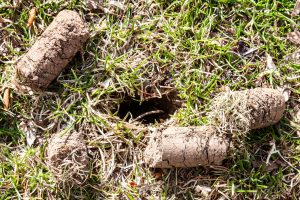Helpful Tips For Homeowners
If you’re trying to achieve the perfect lawn, you may have heard that you need to start at the bottom. That’s right, we mean dirt! You may not realize that questions about soil quality are actually a great starting point. While mowing, feeding, and watering your lawn are all important steps, it really starts with…
Read More...Do you want to save water and still have a beautiful lawn? Sounds impossible! In fact, it’s more attainable than you might think. Drought-tolerant sod is a great option for your lawn, and there are several special varieties designed for drought conditions. You can save money on your utility bills this summer or just have…
Read More...Have you ever looked out across your lawn and noticed thick patches of moss? While moss is not technically a weed, if you aren’t growing it on purpose, it may as well be one. Moss is a simple and ancient plant with a shallow root system. It is an opportunistic plant that will take hold…
Read More...When you research different types of turf, one of the first observations you might make is that some grasses are termed cool season while others are warm season. In fact, these are two broad categories that horticulturalists and turf growers use to describe almost any turf variety. But don’t be fooled by the name. For…
Read More...We’ve all heard the adage, “a dream does not become reality through magic; it takes sweat, determination, and hard work.” And of course, that is especially true when it comes to your lawn-care routine. Unfortunately, there’s no magic wand to wave to get a lush, green lawn. That result requires well-planned, regular maintenance. And while…
Read More...Summer is here, which means it is time to get out and enjoy your lawn. With temperatures on the rise, your attention is certainly turning to the fresh air and your home’s landscaping. And of course, the foundation of enjoying your outdoor space is a beautiful lawn! But a beautiful lawn takes some good planning…
Read More...Field mice can really mess up your lawn. First, no one wants to see mice skittering around under their bare feet as they enjoy your luscious green turf. Second, these rodents can ruin your lawn with their holes. Third, if you have a nearby garden, these field mice can eat your veggies and contaminate your…
Read More...Mowing your lawn is probably the most common lawn maintenance task you perform. Keeping your turf looking great means regular mowing, as much as once a week during peak growing season. So it is easy to overlook the importance of this weekly chore. But if you really want your lawn to look its best, you…
Read More...Are you a lawn care newbie? Maybe you’re a first-time homeowner, or you finally took the exciting plunge and had turf installed in your yard. If you’re looking for information on how to care for your lawn as a beginner, you’re in the right place! We’ve compiled some of the most common lawn care queries…
Read More...It’s almost time to aerate your TifTuf Bermudagrass lawn. It’s something you see on professional lawns all the time. From pro sports to high school soccer fields, spring is marked by a bunch of little rounds of dirt scattered across a grassy expanse. But what about the lawn just outside your home? Do you really…
Read More...








